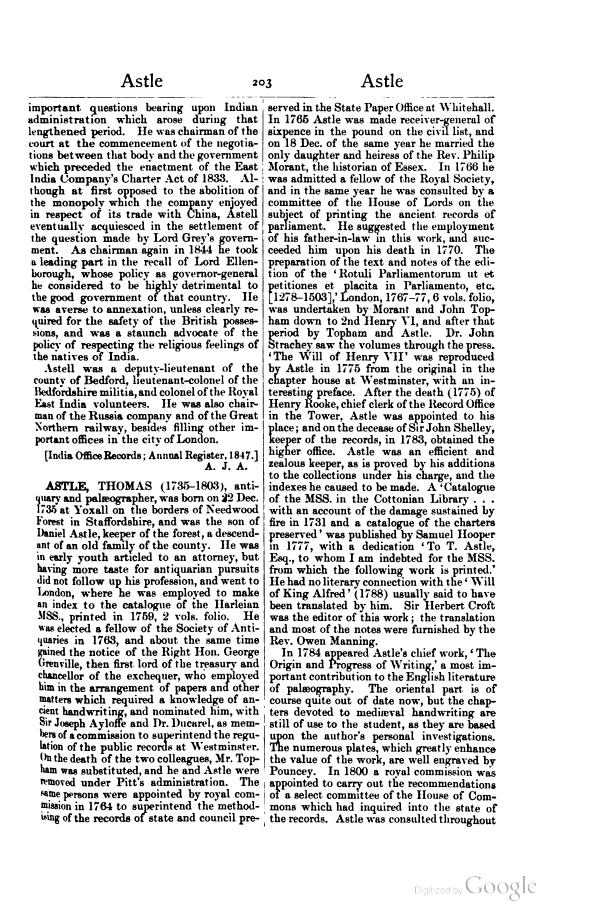important questions bearing upon Indian administation which arose during that lengthened period. He was chairman of the court at the commencement of the negotiations between that body and the government which preceded the enactment of the East India Company's Charter Act of 1833. Although at first opposed to the abolition of the monopoly which the company enjoyed in respect of its trade with China, Astell eventually acquiesced in the settlement of the question made by Lord Grey's government. As chairman again in 1844 he took a leading part in the recall of Lord Ellenborough, whose policy as governor-general he considered to be highly detrimental to the good government of that country. He was averse to annexation, unless clearly required for the safety of the British possessions, and was a staunch advocate of the policy of respecting the religious feelings of the natives of India.
Astell was a deputy-lieutenant of the county of Bedford, lieutenant-colonel of the Bedfordshire militia, and colonel of the Royal East India volunteers. He was also chairman of the Russia company and of the Great Northern railway, besides filling other important offices in the city of London.
[India Office Records; Annual Register, 1847.]
ASTLE, THOMAS (1735–1803), antiquary and palaeographer, was born on 22 Dec. 1736 at Yoxall on the borders of Needwood Forest in Staffordshire, and was the son of Daniel Astle, keeper of the forest, a descendant of an old family of the county. He was in early youth articled to an attorney, but having more taste for antiquarian pursuits did not follow up his profession, and went to London, where he was employed to make an index to the catalogue of the Harleian MSS., printed in 1759, 2 vols, folio. He was elected a fellow of the Society of Antiquaries in 1763, and about the same time gained the notice of the Right Hon. George Grenville, then first lord of the treasury and chancellor of the exchequer, who employed him in the arrangement of papers and other matters which required a knowledge of ancient handwriting, and nominated him, with Sir Joseph Ayloffe and Dr. Ducarel, as members of a commission to superintend the regulation of the public records at Westminster. On the death of the two colleagues, Mr. Topham was substituted, and he and Astle were removed under Pitt's administration. The same persons were appointed by royal commission in 1764 to superintend the methodising of the records of state and council preserved in the State Paper Office at Whitehall. In 1765 Astle was made receiver-general of sixpence in the pound on the civil list, and on 18 Dec. of the same year he married the only daughter and heiress of the Rev. Philip Morant, the historian of Essex. In 1766 he was admitted a fellow of the Royal Society, and in the same year he was consulted by a committee of the House of Lords on the subject of printing the ancient records of parliament. He suggested the employment of his father-in-law in this work, and succeeded him upon his death in 1770. The preparation of the text and notes of the edition of the 'Rotuli Parliamentorum ut et petitiones et placita in Parliamento, etc. [1278-1503],' London, 1767-77, 6 vols, folio, was undertaken by Morant and John Topham down to 2nd Henry VI, and after that period by Topham and Astle. Dr. John Strachey saw the volumes through the press. 'The Will of Henry VII' was reproduced by Astle in 1775 from the original in the chapter house at Westminster, with an interesting preface. After the death (1775) of Henry Rooke, chief clerk of the Record Office in the Tower, Astle was appointed to his place; and on the decease of Sir John Shelley, keeper of the records, in 1783, obtained the higher office. Astle was an efficient and zealous keeper, as is proved by his additions to the collections under his charge, and the indexes he caused to be made. A 'Catalogue of the MSS. in the Cottonian Library ... with an account of the damage sustained by fire in 1731 and a catalogue of the charters preserved' was published by Samuel Hooper in 1777, with a dedication 'To T. Astle, Esq., to whom I am indebted for the MSS. from which the following work is printed.' He had no literary connection with the 'Will of King Alfred' (1788) usually said to have been translated by him. Sir Herbert Croft was the editor of this work; the translation and most of the notes were furnished by the Rev. Owen Manning. In 1784 appeared Astle's chief work, 'The Origin and Progress of Writing,' a most important contribution to the English literature of palaeography. The oriental part is of course quite out of date now, but the chapters devoted to mediaeval handwriting are still of use to the student, as they are based upon the author's personal investigations. The numerous plates, which greatly enhance the value of the work, are well engraved by Pouncey. In 1800 a royal commission was appointed to carry out the recommendations of a select committee of the House of Commons which had inquired into the state of the records. Astle was consulted throughout
